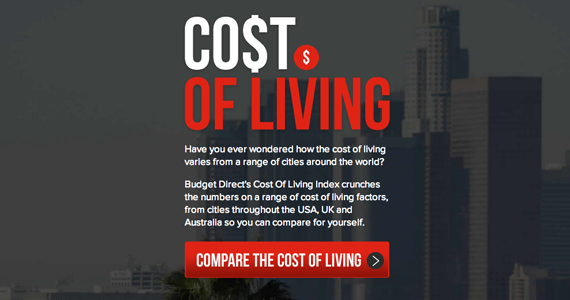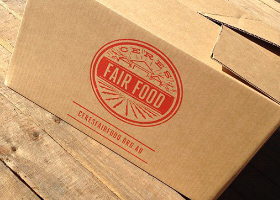Australia: One of the greatest places in the world to live but at what cost?
Author | Tracey Yeung
Whether it’s surfing the net, grabbing a bite out with friends after work or going to see the latest blockbuster movie, on average Australians are paying some of the highest prices in the world.
A new Cost of Living online comparison tool from Budget Direct reveals exactly what prices people are paying across the UK, America and Australia and shows just how much Aussies are forking out to live.
With groceries more expensive in major Australian cities than our English and American counterparts, the issue of food waste, and the economic cost of food waste, is even more pressing.
Of course, the disparity in prices is widespread, and not just in relation to food. One of the standout differences is the cost of a pre-paid mobile phone tariff. Australians are paying on average nearly four times more for this than the US and nearly three times more than they are in the UK. When comparing the individual cities LA costs $0.11 per minute compared to Sydney, which is nearly 9 times more at $1.00 per minute.
The comparison tool, which uses data collected primarily from Numbeo, the world’s largest database of user-contributed data, allows users to compare three cities across a number of key categories including their Weekly Shop, Living and Getting Around.
Aussies will be pleased to know that one of life’s beloved simple pleasures (or, for others, a daily necessity), coffee, is cheaper on average than the UK and the US. On the downside, this is one of only a small handful of things that are markedly less expensive.
An individual bottle of a soft drink, like Coke or Pepsi, may not go down as smoothly knowing that it costs less than half price in some parts of the US than it does in Australia. Two litres of Coke in Sydney will set you back at around $3.52 – with Melbourne coming in at $3.39 – where the same amount costs $2.03 in Los Angeles and $1.77 in Chicago. Likewise, a bottle of wine, if you live in a major Australian city, will cost 10 to 20 per cent more on average, with Sydney ranking as the most expensive overall. The same trend applies for beer.
Weekly shop items can cost twice as much as they would elsewhere, such as tomatoes, milk and bread. White bread costs more than twice as much in Sydney as it would in London, and in Chicago, a litre of milk costs less than 90c, while in Sydney, Melbourne or Brisbane you would have to pay around $1.40. Tomatoes, potatoes and heads of lettuce cost on average 30 to 50 per cent more in Sydney than they would in cities such as Manchester, Birmingham and Chicago. Two dozen eggs will cost you $4.00 in Sydney, but just a bit over $2.00 if you are living in Los Angeles.
With food waste already a critical issue in Australia – as a country, we throw out 4 million tonnes of food each year, a quarter of all food purchased – it is even more important to shop smart in order to minimise the cycle of overproduction and wastage that currently proliferates the food sector of countries like Australia.
Now that’s food for thought.
To see how much your weekly shop costs in Sydney compared to London or to see how much a night out would cost in Melbourne compared to Los Angeles, visit the cost comparison tool here.






